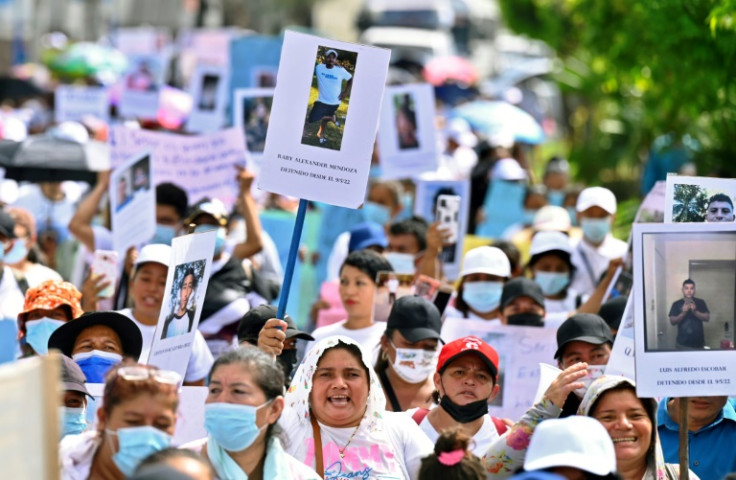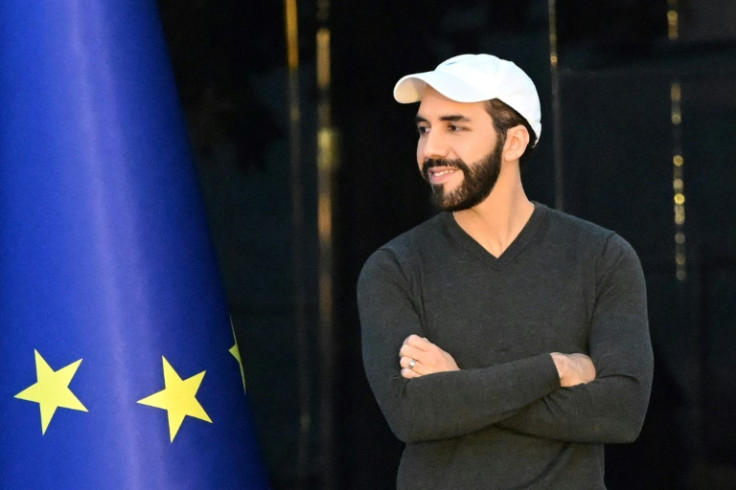Nayib Bukele, El Salvador's Unapologetic 'Dictator'

El Salvador's gang-busting President Nayib Bukele has proudly embraced the monicker of "dictator" and breezily shrugs off criticism of human rights transgressions.
In five years in power, the 42-year-old millennial businessman and former mayor has become globally known, and domestically loved, for his no-holds-barred "war" on gangs.
But he has also had the military storm parliament, replaced judges he thought hostile, and overseen the jailing of innocent people, observers say, in his campaign to make the country safer.
Bukele has denounced rare protesters for "vandalism," and called independent media and critics liars and defenders of criminality.
Yet Bukele polls as the most popular president in Latin America, possibly the world.
"He fosters a cult of personality; there's devotion to him," analyst Michael Shifter of the Inter-American Dialogue think tank in Washington told AFP.
"His charisma and his communication skills are without peer in Latin America."
Bukele is a social media whiz with a sharp beard who spurns convention and often ditches ties and the presidential sash in favor of jeans and a baseball cap.
A photo with Lionel Messi, a selfie in the rostrum at the UN General Assembly: Bukele posts prodigiously on X, YouTube and Facebook, bypassing traditional platforms to communicate directly -- often in English -- with his millions of fans at home, and increasingly abroad.
Of Palestinian heritage, Bukele is a son of San Salvador, the capital, where he was born in 1981.
He studied law at the Central American University but didn't graduate, and joined his father's business empire of textiles, pharmaceuticals and publicity at the age of 18.
Bukele started his political career in his early 30s, serving as mayor of a San Salvador suburb then of the capital itself.
In 2019, he graduated to the presidency -- upending an unpopular, corruption-riddled two-party system in power since El Salvador's civil war ended nearly three decades earlier.
And since March 2022, he has presided over a gang roundup credited with plummeting homicide rates that have allowed life to return to near normal in what was one of the most dangerous countries in the world.
It is a success the president likes to hammer home online, drowning out grumblings about creeping authoritarianism and economic woes.
"We have turned the most insecure country in the world into the safest country in the entire Western Hemisphere," Bukele boasted when his government announced that 2023 had the lowest murder rate in three decades.
Not a fan of criticism, Bukele often resorts to irony online.
He frequently changes his handle on X, formerly Twitter, having self-identified as "dictator of El Salvador" and the "world's coolest dictator" in a sarcastic nod to detractors.
Today he goes by "Philosopher King."
In spite of an apparent love for banter, Bukele has shown himself to be nothing if not ruthless.
When gangs vowed to kill people at random in a response to his state of emergency, Bukele simply threatened to deprive jailed gangsters of food.
Shortly after taking office, he ordered heavily armed police and soldiers to storm a then opposition-led parliament to intimidate MPs into approving a loan to finance an anti-crime plan.
That led lawmakers to call for a congressional committee to have him declared "mentally incapable" of governing.
Bukele's New Ideas party and its allies subsequently won a majority in the legislative assembly which promptly replaced the five judges of the Supreme Court's highest chamber and El Salvador's attorney general -- two institutions with which the president had clashed.
It also replaced a third of all the country's judges in what some see as part of a worrisome consolidation of power.
The newly Bukele-aligned Supreme Court allowed him to seek reelection despite a constitutional single-term limit -- giving him a six-month leave of absence prior to the vote, with a caretaker president in place.
Bukele is also headstrong. He took a gamble on bitcoin, swatting away warnings about volatility risks to have it declared official tender and investing an undisclosed amount of taxpayer money in the currency.
Bukele is married to Gabriela Rodriguez, a psychologist and ballet dancer with whom he has two children.

© Copyright AFP {{Year}}. All rights reserved.





















